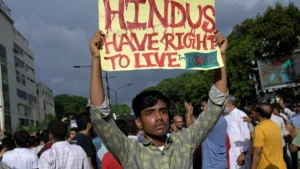The United Nations’ new humanitarian chief has warned that tough choices will be required as he appealed for more than $47bn to deliver aid next year.
The head of the Office for the Coordination of Humanitarian Affairs (OCHA), Tom Fletcher, said during an annual funding appeal on Wednesday that he was looking to 2025 with “dread” after a bout of “donor fatigue” left more than half of this year’s call for $50bn unfulfilled.
“The world is on fire, and this is how we put it out,” Fletcher told reporters in Geneva, noting that action is desperately needed due to spiralling conflicts in places like Gaza, Sudan and Ukraine, while climate change and extreme weather, are also causing “an unprecedented level of suffering”.
The OCHA chief pledged to be “ruthless” in prioritising how the $47.4bn being sought for next year would be spent. Plans are being drawn up to channel assistance to “those in the most dire need,” he said, which includes about 190 million people fleeing conflict and battling starvation. Overall, the UN hopes to reach people in 32 countries next year.
As of last month, only 43 percent of the $50bn appeal for 2024 had been met, with underfunding causing an 80 percent reduction in food assistance in Syria, cuts to protection services in Myanmar, and diminished water and sanitation aid in cholera-prone Yemen, the UN agency said.
The United States, which contributed more than $10bn last year, is the biggest donor. Acknowledging fears that President-elect Donald Trump might cut funding, Fletcher said he expected to spend “a lot of time” in Washington over the next few months.
Jan Egeland, head of the Norwegian Refugee Council, who headed OCHA from 2003-2006, said US funding was “a tremendous question mark”.
“Should the US administration cut its humanitarian funding, it could be more complex to fill the gap of growing needs,” he said.
The 2025 appeal is the fourth largest in OCHA’s history, but Fletcher underlined that it still leaves out some 115 million people whose needs the agency cannot realistically hope to fund.
The global humanitarian system “is overstretched, it’s underfunded and it’s literally under attack”, Fletcher said. “We need a surge in global solidarity,” he said.
At least 281 humanitarian workers have been killed this year, the highest number on record, in places including Gaza, Sudan, Ukraine and the Democratic Republic of the Congo.




